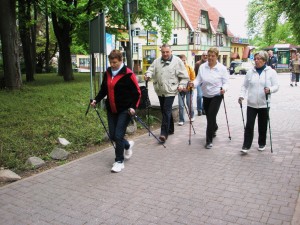It’s long been thought that the genes we inherit are not as important as the mechanisms that switch them on or off. Studies of identical twins show that when one can develop dementia while the other does not. Life-style choices are thought to be important, and when it comes to preventing dementia regular exercise is always top of the list.
Now researchers at the University of Maryland in America have published a study showing that physical exercise prevented brain shrinkage in people in their 60s and beyond – including those with the gene (APOE-e4) that is thought to increase the risk of Alzheimer’s tenfold.
The only brain shrinkage occurred in those with the gene who did little or no exercise; whereas those (with the gene) who were at least moderately physically active three times a week or more were protected. The exercise included brisk walking, jogging, swimming and cycling.

The researchers measured the brain size of four groups of older people in their 60s, 70s and 80s at the start and end of the 18 month study. Exercise levels were monitored and they were tested for the gene APOE-e4. The only brain shrinkage occurred in those with the gene who did little or no exercise.
The study was published in the journal, ‘Frontiers in Ageing Neuroscience’, and reported in British newspaper the Daily Mail.
Apathy can be a big ‘downer’ for older people, so much so that it’s often mistaken for depression. Now researchers say it may be down to brain shrinkage – and that could be preventable. Researchers found that compared with people who didn’t have apathy, those who reported two or more symptoms of apathy had 1.4 percent smaller volume of grey matter—the area of the brain where learning occurs and memories are stored. In addition, their white matter—which connects different areas of the brain—was 1.6 percent smaller.
But it’s not inevitable in old age and could be headed off, according to a study by the National Institute on Aging at the National Institutes of Health, published in the journal Neurology. Lead author, neuroepidemiologist Lenore J. Launer, said, ‘Apathy symptoms are common in older people without dementia. And the fact that participants in our study had apathy without depression should turn our attention to how apathy alone could indicate brain disease.’
Researchers used brain volume, measured by an MRI scan, as an indication of advanced brain aging. While brain volume normally decreases as one ages, a larger loss can indicate the presence of certain types of dementia, such as Alzheimer’s disease.
This study showed that areas of the brain affected in people with apathy were similar to the parts of the brain changed by dementia.
(http://www.healthline.com/health-news/apathy-and-brain-041614)
True for mice and men!
Exercise reduces stress; builds resilience and releases biochemical s that make us feel better about ourselves, say dozens of studies. To see how much exercise is needed to reduce stress, researchers at the National Institute of Mental Health noted how it changed the interactions between bold and meek mice.
When placed in the same cage bold mice tend to bully meeker ones. In this study, the meek mice that did not exercise (their equipment was removed) before being put in with the bold mice cowered in dark corners or froze. They were extremely stressed and nervous.
Yet when the same meek creatures had a chance to exercise before encountering their bullies they showed resistance to stress. Although they were submissive while living with the aggressive mice they bounced back when they were alone. Researchers concluded that even a small amount of exercise gave the meeker mice emotional resilience.
The scientists looked at the brain cells of these ‘stress-resistant’ mice and found that the rodents exhibited more activity in their medial prefrontal cortex and their amygdala, both of which are involved in processing emotions. The mice that did not exercise before moving in with the aggressive mice showed less activity in these parts of the brain.
The motto could be ‘exercise before meeting your boss!’ Happily, most of us have good, supportive managers these days. Yet who could say their lives are without stress?
A twenty minute brisk walk in the park, three times a week, could make a huge difference to our wellbeing – which we, in turn, would pass on to others. So, at the first sign of apathy, get out your old trainers and go!
http://www.scientificamerican.com/article/why-does-exercise-make-us-feel-good/















